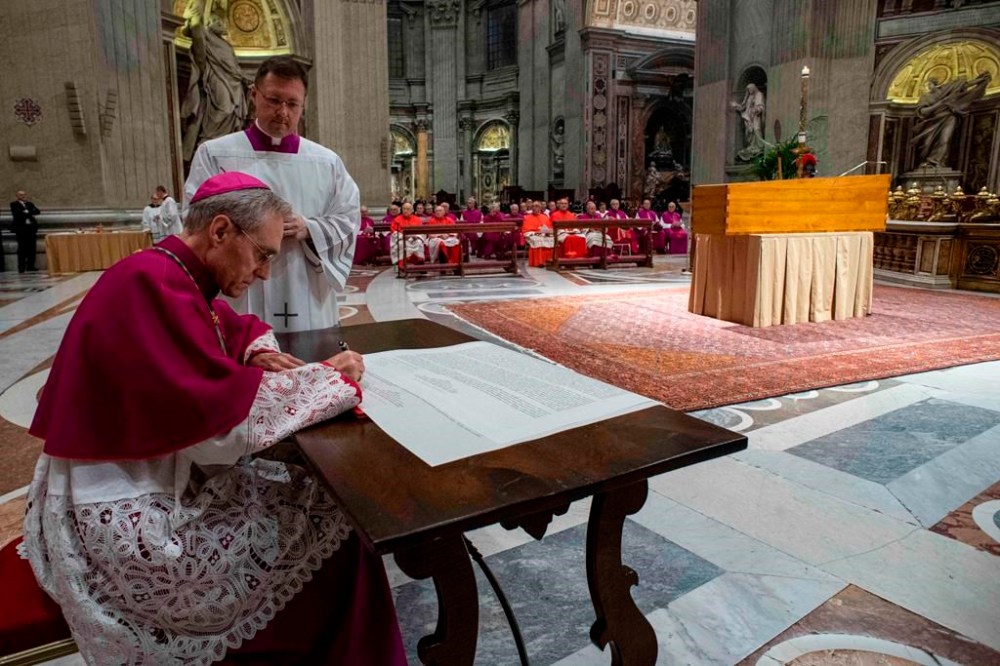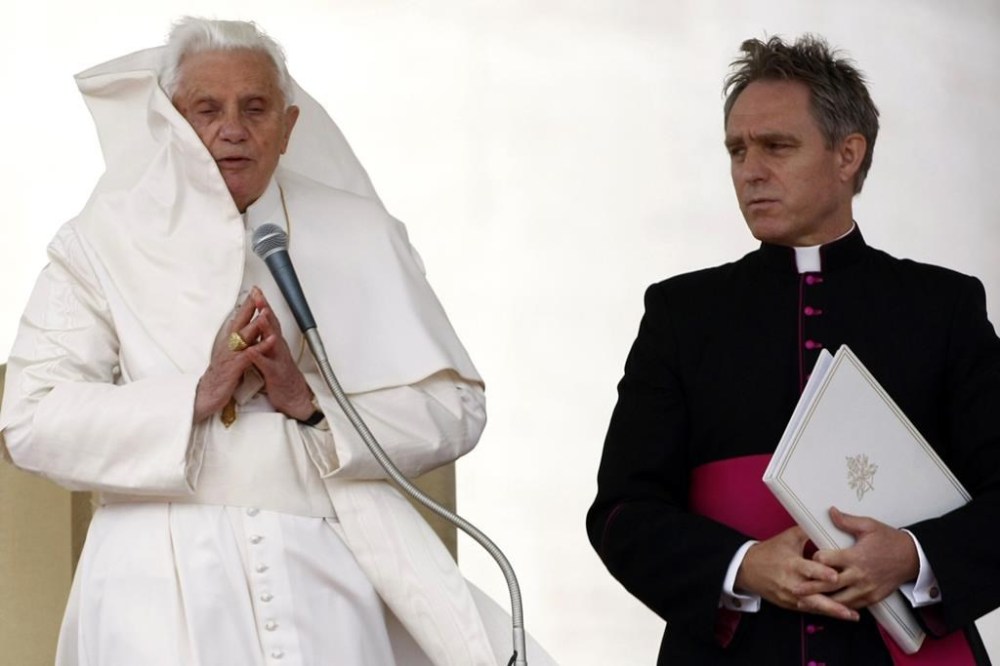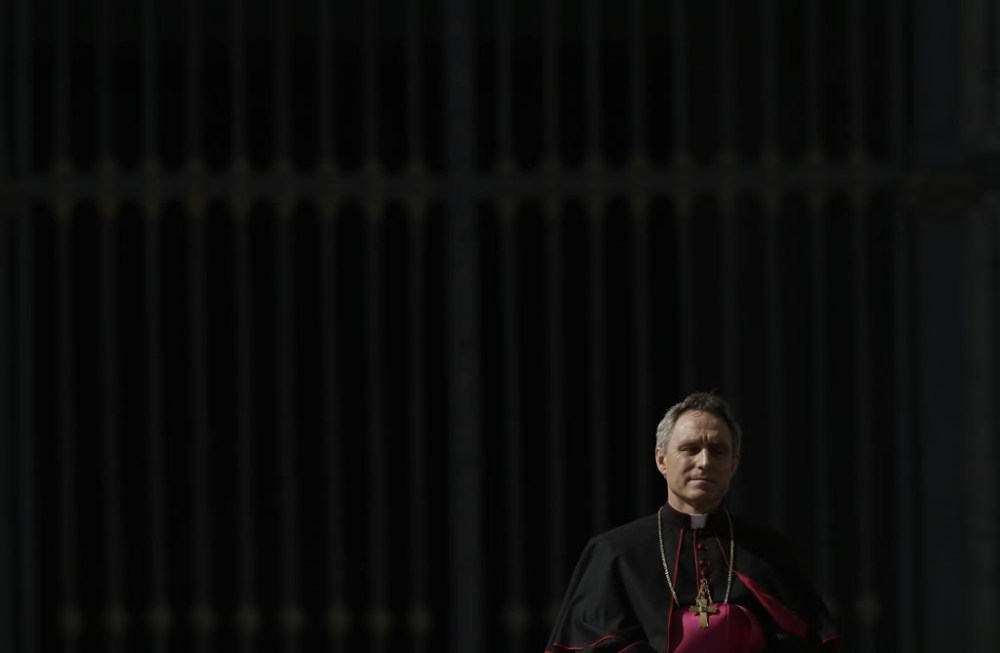Pope meets with Benedict’s aide amid revelations in new book
Advertisement
Read this article for free:
or
Already have an account? Log in here »
To continue reading, please subscribe:
Monthly Digital Subscription
$19 $0 for the first 4 weeks*
- Enjoy unlimited reading on winnipegfreepress.com
- Read the E-Edition, our digital replica newspaper
- Access News Break, our award-winning app
- Play interactive puzzles
*No charge for four weeks then billed as $19 plus GST every four weeks. Offer only available to new and qualified returning subscribers. Cancel any time.
Read unlimited articles for free today:
or
Already have an account? Log in here »
Hey there, time traveller!
This article was published 08/01/2023 (716 days ago), so information in it may no longer be current.
ROME (AP) — Pope Francis met on Monday with Archbishop Georg Gaenswein, the longtime secretary of Pope Benedict XVI who was a key figure in his recent funeral but who has raised eyebrows with an extraordinary memoir in which he settles old scores, reveals palace intrigues and casts Francis in a deeply unfavorable light.
The Vatican provided no details about the content of the private audience, other than to say that it happened.
Speculation about Gaenswein’s future has swirled now that his main job tending to Benedict has come to an end following his Dec. 31 death. But questions have also been raised about what Francis will do with Gaenswein following this week’s publication of his tell-all book, “Nothing But the Truth: My Life Beside Pope Benedict XVI.”

Some Vatican watchers see the book as the first salvo in a new era of anti-Francis attacks from the conservative right, for whom Benedict remained a nostalgic point of reference in retirement. Benedict’s death, and Gaenswein’s postmortem revelations, have removed the façade of a happy cohabitation of two popes.
In the text, Gaenswein reveals previously unknown details of some of the biggest hiccups and bad blood that accrued during the last 10 years in which Benedict lived as a retired pope following his 2013 decision to retire, the first pope in six centuries to do so.
In one of the most explosive sections, Gaenswein says he was “shocked and speechless” when Francis essentially fired him from his day job as the head of the papal household in 2020 after a scandal over a book Benedict co-authored. Francis told Gaenswein to stop coming to the office and to dedicate himself to caring for Benedict, essentially ending his job as the “bridge” between the pontificates.
Printing previously secret letters between the two popes and relaying private conversations with both, Gaenswein revealed that Francis even refused entreaties from Benedict to take him back on. Embittered, Gaenswein described Francis as insincere, illogical and sarcastic in deciding his fate, and said Benedict even made fun of Francis when told of the decision.
“It seems as if Pope Francis doesn’t trust me anymore and is making you my chaperone,” Gaenswein quoted Benedict as saying.
Gaenswein also wrote of his dismay that, years earlier, Francis had refused him the right to live in the palace apartment occupied by his predecessor. After a longer-than-usual refurbishment, Francis gave the flat instead to the Vatican foreign minister, forcing Gaenswein to continue living in the monastery that Benedict called home.

Gaenswein’s future remains uncertain, and his memoir is certainly going to complicate relations with the current pope who will decide his fate. As an archbishop, he technically could be appointed to lead an archdiocese in his native Germany. Asked about that possibility, the head of the German bishops conference said last week that it wasn’t up to him but Francis. In addition, some Vatican commentators have suggested Gaenswein could be appointed as a Vatican ambassador, to run an important shrine or to resume his academic career.
His book is likely to win him points with Francis’ traditionalist critics, since he does what Benedict declined to do for 10 years and reveals publicly what the late pope purportedly thought about his successor’s decisions on two crucial issues: Gaenswein writes, for example, that Benedict believed Francis’ decision to reinstate restrictions on celebrating the old Latin Mass was an “error” and that his outreach to divorced and civilly remarried Catholics was “perplexing.”
He also gets in something of another dig when he quotes Francis as saying that having Benedict in the Vatican was like having a wise grandfather at home, to whom he could turn to for advice. Gaenswein quoted Benedict as noting that he was only nine years older than Francis and that “maybe it would be more correct to call me his ‘older brother.’”
Gaenswein, a 66-year-old German canon lawyer, stood by Benedict’s side for nearly three decades, first as an official working for then-Cardinal Joseph Ratzinger in the Congregation for the Doctrine of the Faith, then starting in 2003 as Ratzinger’s personal secretary.
He followed him to the Apostolic Palace when Ratzinger was elected pope, and then into retirement when Benedict stepped down. In that capacity, he remained Benedict’s gatekeeper, confidant and spokesman, and in the new book appears keen to set the record straight to defend Benedict and himself one more time.
In it, he rekindles old dust-ups with journalistic coverage of him or Benedict from everything to the type of letterhead he used to a phrase he uttered, suggesting he had kept track all these years and, with Benedict’s death, felt he finally could speak out.

While there is no playbook outlining how a secretary to a retired pope should behave, publishing a book within a week of his death that critiques his successor, reveals private correspondence and nurses old grudges in finely documented detail certainly doesn’t follow the reserve typical of Vatican protocol.
Austen Ivereigh, a biographer to Francis who co-authored a book with him, noted in a series of tweets Monday that Gaenswein’s book actually seemed to violate a core promise Benedict made when he resigned: that he would be obedient to his successor.
“These disclosures undermine Benedict’s oath of loyalty to Francis, which Benedict stuck to rigorously; violate Gaenswein’s duty of confidentiality to both … and encourage those who seek wrongly to set Benedict’s legacy against Francis,” Ivereigh wrote.
The Free Press acknowledges the financial support it receives from members of the city’s faith community, which makes our coverage of religion possible.

